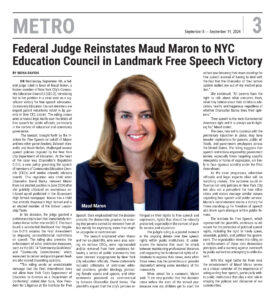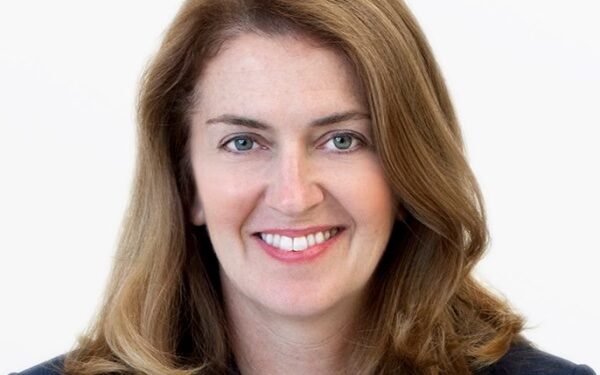On Wednesday, September 4th, a federal judge ruled in favor of Maud Maron, a former member of New York City’s Community Education Council 2 (CEC 2), reinstating her to her position in a case seen as a significant victory for free speech advocates. Community Education Council members are unpaid parent volunteers voted in by parents in their CEC district. The ruling comes amid a heated legal battle over the limits of free speech for public officials, particularly in the context of education and community governance.
The lawsuit, brought forth by the Institute for Free Speech on behalf of Maron and two other parent leaders, Deborah Alexander and Noah Harlan, challenged several speech policies imposed by the New York City Department of Education. At the heart of the case was Chancellor’s Regulation D-210, a new policy governing the speech of members of Community Education Councils (CECs) and similar citywide advisory boards. This regulation was cited when Chancellor David Banks removed Maron from her elected position in June 2024 after she publicly criticized an anonymous anti-Israel op-ed published in the Stuyvesant High School newspaper. Maron has a child that attends Stuyvesant High School and is an elected member of the School Leadership Team.
In his decision, the judge granted a preliminary injunction that immediately reinstates Maron to her role on CEC 2. The court found a substantial likelihood that Regulation D-210 violates the First Amendment by imposing unconstitutional restrictions on speech. The ruling also prevents the enforcement of other restrictive measures, such as the CEC 14 “Community Guidelines” and “Community Commitments,” which were used to censor and punish parent leaders who voiced dissenting opinions.
“This ruling sends an unmistakable message that the First Amendment does not allow New York City’s Department of Education to function as a Department of Conformity,” stated Alan Gura, Vice President for Litigation at the Institute for Free Speech. Gura emphasized that the decision protects the democratic process by ensuring that parents cannot be removed from office merely for expressing views that might be unpopular or controversial.
The lawsuit originated when Maron and her co-plaintiffs, who were also serving on various CECs, were reprimanded and/or removed from their positions following a series of public statements that were deemed inappropriate by New York City education officials. These statements included criticisms of anti-Israel editorial positions, gender ideology, protecting female sports and spaces, and other comments perceived as controversial by Schools Chancellor David Banks. The plaintiffs argued that the city’s policies infringed on their rights to free speech and expression, rights that should be robustly protected, especially in the context of public service and education.
The judge’s ruling is a pivotal moment in the ongoing debate over free speech rights within public institutions. It underscores the balance that must be struck between maintaining professional decorum and respecting the fundamental rights of individuals to express their views, even when those views may be contentious or provoke discomfort among some members of the community.
When asked for a comment, Maron said. “I am very grateful that this decision came before the start of the school year because now my children get to start the school year knowing their mom stood up for free speech instead of having to deal with the fact that the Chancellor of their school system bullied me out of my elected position.”
She continued, “All parents have the right to talk about what concerns them, what they believe about their children’s education, health, and happiness regardless of whether Chancellor Banks likes their opinions.”
“Free speech is the most fundamental American right and it is always worth fighting for,” Maud stated.
The case, now set to continue with the preliminary injunction in place, may have broader implications for parents, public officials, and government employees across the United States. The ruling suggests that speech restrictions imposed by government bodies, especially those targeting specific viewpoints or forms of expression, are likely to face rigorous scrutiny under the First Amendment.
As the case progresses, education officials and legal experts alike will be watching closely. The outcome could influence not only policies in New York City but also set a precedent for how other cities and states manage similar issues regarding free speech and public service. Maron’s reinstatement marks a victory for those standing up for freedom of speech and more open dialogue within public forums.
The Institute for Free Speech, which represented the plaintiffs, continues to advocate for the protection of political speech rights, including the right to freely speak, assemble, publish, and petition the government. The organization views this ruling as a reinforcement of these core democratic principles and a warning against overreach by public authorities attempting to stifle dissent.
With this legal battle far from over, the reinstatement of Maud Maron serves as a critical reminder of the importance of safeguarding free speech, particularly within public institutions that play a vital role in shaping the policies and discourse of our communities.










